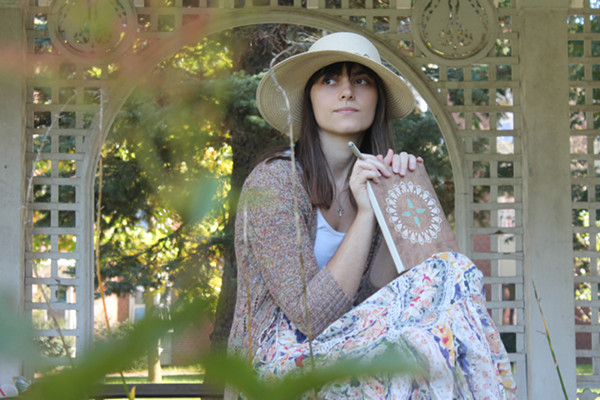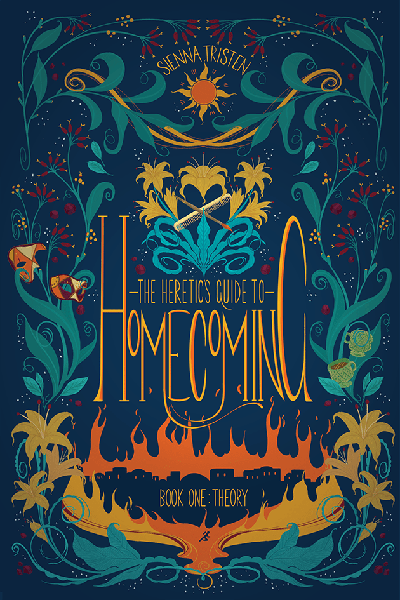
Please introduce yourself and your book!
My name is Sienna Tristen, and I’m a queer, neurodivergent artist and writer trying to process the utter chaos of life through mostly book-shaped stories. I dabble in several arts, and I’ve published a book of poetry (The Insomniac’s Assistant, Penrose Press), but my pride and joy is currently the work I do for The Shale Project, a “multimedia storytelling initiative roughly in the shape of a planet” that I co-founded with my partner Avi Silver.
The flagship work of the Shale Project was my novel, The Heretic’s Guide to Homecoming, which I’d describe as an ‘introspective fantasy’. The story takes place in a rich, sprawling fantastical world, but it’s not about huge political manoeuvres or campaigns to vanquish a Dark Lord. It’s more of an internal coming-of-age story: our protagonist, Ronoah Genoveffa Elizzi-denna Pilanovani, feels (understandably) far too small for his name. He’s set out from home to prove himself but keeps on self-sabotaging into trickier and trickier spots; just as he’s about to run out of options, an enigmatic traveler offers to bring him to the most holy place on the planet, a land called the Pilgrim State, and gives him the chance to redeem himself.
At its core, Heretic’s Guide is about an anxious young man desperate to attain some self-compassion, and the kindness and generosity of the individuals he meets on his pilgrimage. It’s a mental health narrative disguised as a fantasy adventure. You can check out the first chapter for free here!
What is the real-life story behind your book?
Heretic’s Guide is, of course, a novel. It’s fiction. But it is also, in a very real way, my literal guide to navigating issues of anxiety and self-worth. I started writing it when I was nineteen, and had a lot of big existential fears and seemingly unanswerable questions; the story was my way of embedding every useful answer I found into a narrative, so I could more easily access it than, say, the latest TED Talk on mental health. I think we retain lessons better when they’re layered in story.
Anxiety comes in a rainbow of shades, and not every part of Ronoah’s experience is akin to my own. But there’s enough common ground between us—and between other people experiencing mental health issues—that watching him grow and come into his own helped to kickstart the process of examining the ways I could be kinder and more forgiving towards myself, and less afraid of failure.

How do you deal with creative block?
This is so typical of me, but, well, I brain-hack it. In high school psychology class I learned how the brain forms incredibly strong associations between sensory input and the surrounding circumstances, and so I decided to consciously develop a ‘writing trigger’.
Here’s how it works: I picked a flavour of tea and then expressly forbade myself from making or drinking it unless I was sitting down to write. After two or three weeks of sustained effort, the brain goes, “oh, that taste/smell is the Writing Taste/Smell” and so when I’m feeling blocked, I’ll take ten minutes to boil the kettle and steep a pot of writing tea. Usually, by the time I’ve taken the first couple of sips, something’s loosened up and I can press onward.
Do you have tips on choosing titles and covers?
Speaking as both an illustrator and as a linguist, I do, and they both go along these lines: don’t just follow the market trend. Investigate what’s being done to death in your genre, and then try to innovate something that would actually engage your interest.
With fantasy books, for covers, that means quit with the stock image of a girl in armour/a dress looking over her shoulder with a dragon in the back. There are so many of those that, even if your work is true and unrepeatable genius, I probably won’t pick it up off the shelf.
Ditto with this “X of Y and Z” naming convention. You know what I’m talking about: A Road of Stone and Cinder. A Sword of Glass and Gold. The Toilet Plunger of Hubris and Ineptitude. I’m making these up, but I wouldn’t be surprised if they all actually existed (minus the third—if that’s out there, count me curious). I don’t want the formula to die in a fire, but I’d like to see more prudence with regards to employing it.
How do bad reviews and negative feedback affect you and how do you deal with them?
An author friend who has seen far more fame—and therefore criticism—than I have explained it to me once in a very clarifying way: the reader brings all of their beliefs and prejudices and expectations to the table when they pick up a book. They’re looking for a particular experience when they read. If your work fails to spark that experience for them, they may leave negative feedback—but it has nothing to do with the objective quality of the work.
This had a huge impact on how I choose to view reader feedback. In fact, it’s made it so that I relish those two- and one-star reviews, because it means, somehow, my work is reaching far and wide enough that it’s tumbling into hands that have never been anywhere near mine. These are not just friends and family who are semi-obligated to say nice things to me about my work: they’re total strangers who owe me and my books absolutely nothing. There’s a thrill in that reach.
Granted, there is a difference between a bad fit between book and reader, and a work perpetuating harmful stereotypes and systemic oppression. If someone alerted me to having done a bad job representing an experience I haven’t had, I’d take that seriously. There’s always a lot to learn.
What are your plans for future books?
Currently I’m smack in the middle of drafting the second half of the Heretic’s Guide duology. The first book is subtitled Theory, and so of course the sequel is dubbed Practice. All the coping skills and mindset shifts that Ronoah goes through in book one must be applied as he moves through a world that is less gentle and patient than the one he’s left behind. The power dynamics of relationships and societies, the utility of truth and falsehood, the insistence on wonder in a world full of doubts—these are the things I’m playing with right now.
Beyond that, I’m slowly gathering imagery for my second collection of poetry, and just recently I dreamed up some thematic scaffolding for the novels I’ll be writing post-Heretic’s Guide. Can’t say anything yet—gotta let it cook!
Websites:
http://www.siennatristen.com/
http://www.welcometoshale.com/
Twitter: @siennatristen